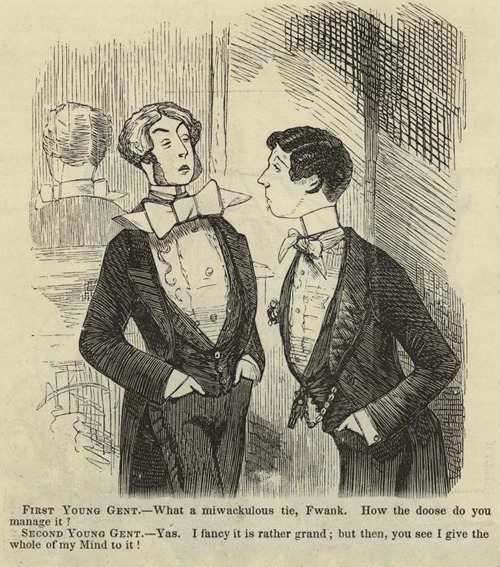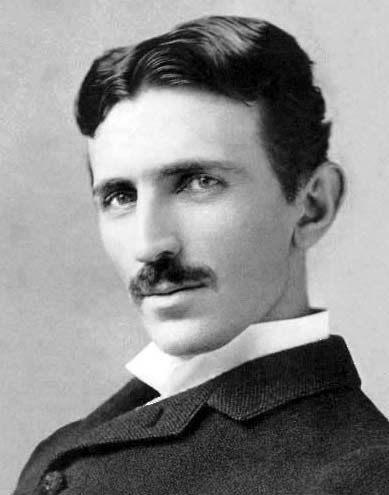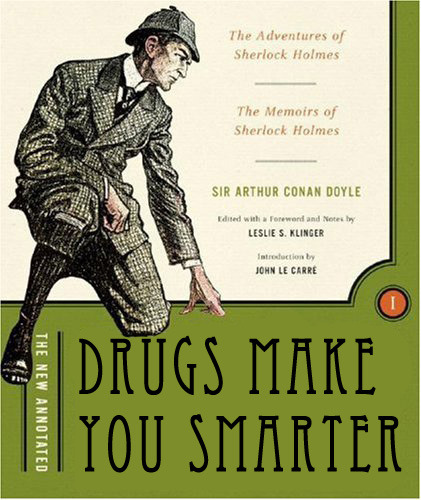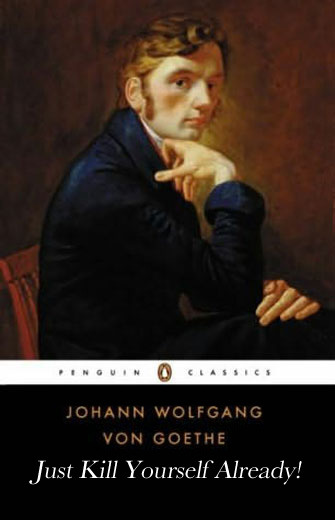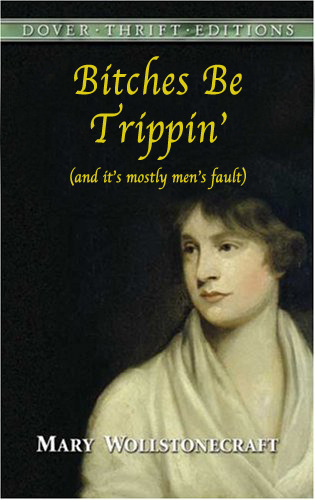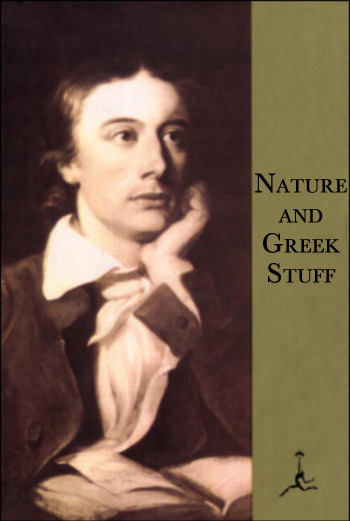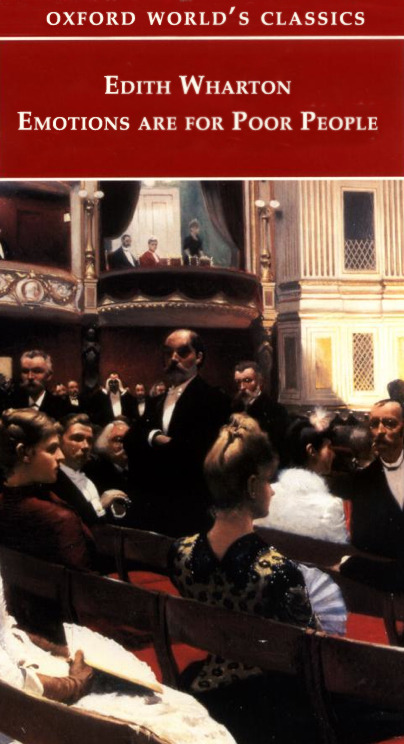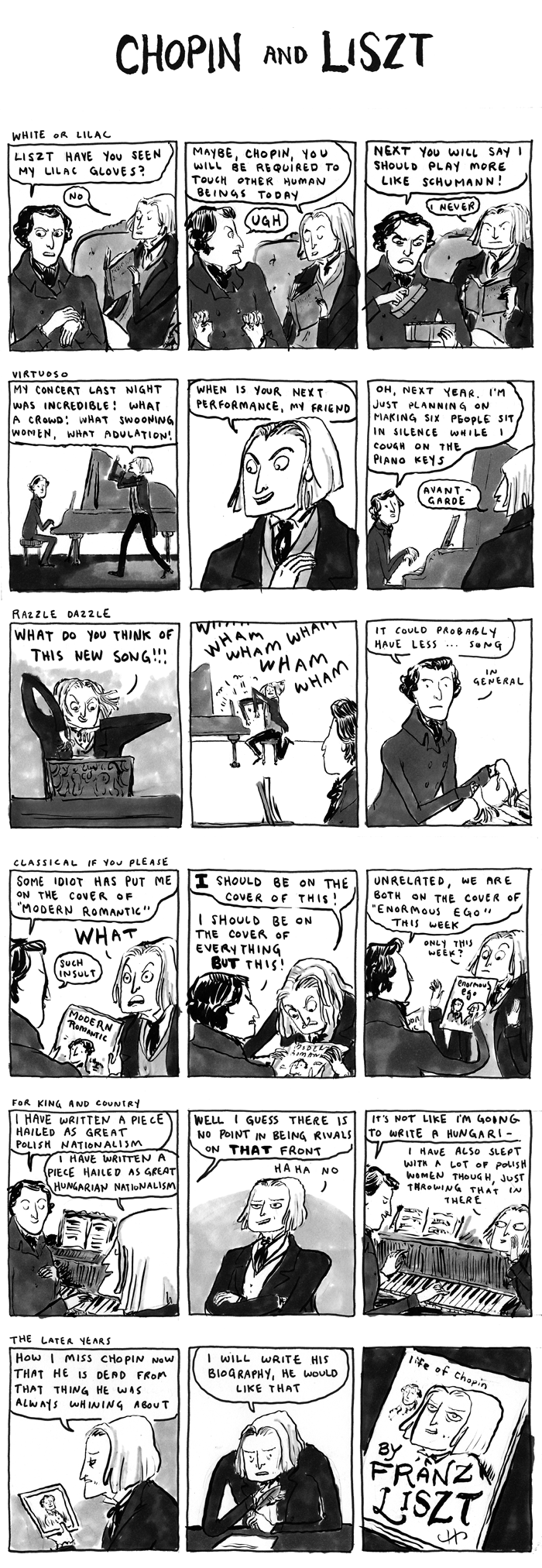To the left you can even see Hodge's eaten oyster.
Monday, December 26, 2011
Belated Cat-Mass
To the left you can even see Hodge's eaten oyster.
Friday, December 23, 2011
Got milk?
Though Dr. Samuel Johnson, writer of the first really complete English dictionary, fed his famous cat Hodge oysters every morning, it appears the good doctor had some trouble keeping Hodge in milk. Dr. Johnson owed his milkman so much that said milkman tried to have Dr. Johnson arrested and hauled off to Debtor's prison. In reponse, Dr. Johnson put a chain across his door and then dragged his bed down the stairs to use as a barricade, all the while shouting that he would defend his citadel to the last.
The Amateur Historian would not advise adopting this method when Visa, MasterCard, request that you pay for all your Christmas shopping.
Wednesday, December 7, 2011
Poor Elizabeth....
“I don’t think Robert Browning was very good in bed. His wife probably didn’t care for him very much. He snored and had fantasies about twelve-year-old girls.”
Monday, December 5, 2011
Zing!
“There are two ways of disliking poetry; one way is to dislike it, the other is to read Pope.”
Saturday, December 3, 2011
Call Ralph Lauren-- we have a new spring color!
I have been writing with a vile old pen the whole week, which is excessively ungallant. The fault is in the Quill: I have mended it and still it is very much inclin'd to make blind es. However these last lines are in a much better style of penmanship thof [for though] a little disfigured by the smear of black currant jelly; which has made a little mark on one of the Pages of Brown's Ben Jonson, the very best book he has. I have lick'd it but it remains very purplue [for purple]. I did not know whether to say purple or blue, so in the mixture of the thought wrote purplue which may be an excellent name for a colourmade up of those two, and would suit well to start next spring.
Thursday, December 1, 2011
Thanks for the advice Talleyrand
However, the laws of celibacy of the Catholic Church did not suit Talleyrand in the slightest. He was defrocked after being un-frocked with an equally undressed lover. Later on, Talleyrand explained his popularity with the ladies as such:
"For a woman, to have an abbé had a double advantage. The first was to be sure that your secret would be safe; the second was to be sure of receiving absolution."
The Hotness of King George
Friday, November 25, 2011
The very shoe roses had to be got by proxy....
For the historical costumers and other fashion fans that follow this blog:
"Pemberley" Regency Shoe Pre-Sale OPEN + Giveaway!
Go forth, merry historical holiday shoppers, and order a pair of Pemberlies, the perfect Regency shoe, for your Jane Austen-obsessed love one, or treat yourself!
Pre-Order Now
November 25 - December 9
$80 (
Click Here
Ordering is UNLIMITED, on all women's USA sizes 6 through 12, including half sizes.
Orders of 5 + receive the special pre-order price, plus quantity and shipping discounts.
Delivery in early 2012.
*We need to sell just over 100 pairs of Pemberlies in order to manufacture them. If we don't meet that goal, all of you who did order will have to be refunded in full, and the Pemberlies will be canceled. If this is the Regency shoe of your dreams, please share, blog, tweet, tumble, stumble, and pass the news along.*
And when you share, you could win....
The "Pemberley" Regency shoes are closely based on extant footwear from the 1790s through 1810. The smooth, dyable, hand-sewn leather upper is designed to be lovely enough formal occasions, and durable enough for walking in the countryside. Particular attention was paid to the point of the toe, as well as the other hallmarks of Regency historical footwear, with the main goals being both historical accuracy and all-day comfort
Wednesday, November 23, 2011
"Ca ira mon amour" - Rod Janois (1789 Les Amants de la Bastille)
IT WILL BE MY LOVE
(Translation by the Amateur Historian, will whatever vague intellectual property things come from an amateur internet translation. If you use it, Gentle Readers, steer people back to my blog, is what I'm saying.)
This fear which undresses me
To have dared to put your name on my skin
And these tears which remove your make-up
Come take my reason under their streams
Despite it all
The looks which shoot
Close to us
The flag that wavers
After all
We don’t care
Care, care, care….
It will be, my love!
Ah! It will be forever!
Go, lovers, declare our forbidden vows
It will be my love!
One will forget the military drums
On all the walls I will write, I swear it,
Dear Liberty!/ Liberty my dear!
I have dreamed of our touching bodies
Caressed by the spirit of our ideals
I put my tongue on your mouth
Savoring the essence of your smallest words
Despite it all
Desire is fragile
Close to us
Pleasure in danger
After all
We don’t care
Care, care, care….
It will be my love!
Ah! It will be forever!
Go, lovers, declare our forbidden vows
It will be my love!
One forgets the military drums
On all the walls I will write, I swear,
Dear Liberty!/ Liberty my dear!
My love
It’s your life that I marry/ take on
In that day
Set in red roses
Go, lovers
One must laugh and dance
Here is the free spring!
It will be my love.
We will write that great day
I will offer you my nights for life
It’s promised.
It will be my love!
Ah! It will be forever.
Go, lovers, declare our forbidden vows.
It will be my love.
One will forget the military drums
On all the walls I will write, I swear it,
LIBERTY!
Tuesday, November 22, 2011
1789 Ca ira mon amour - Rod Janois (clip officiel)
Friday, November 11, 2011
Bringing New Meanings to Crimes Against Fashion
London haberdasher John Hetherington decided to wear his on the Strand on January 15, 1795, and caused such a riot that he was brought before the Lord Mayor the next morning. He was charged with "walking down a public highway wearing upon his head a tall structure having a shining lustre calculated to alarm the people."
The Lord Mayor, taking into account eye-witness accounts that "women had fainted... children had gone into hysterics and... one lad sustained a broken arm through the violence of the mob" ignored Hetherington's assertion that he had the right to dress as he chose and fined him the modern-day equivalent of $5,000.
Tuesday, November 8, 2011
Cutest Napoleon Ever?
Saturday, November 5, 2011
Friday, November 4, 2011
The Three Musketeers Never Do Use Muskets
Tuesday, November 1, 2011
Halloween Poe-st
Saturday, October 29, 2011
A little Halloween inspiration?
Monday, October 24, 2011
Shocking
Even though, later in life, Tesla spoke to pigeons, he grew up with cats and when petting his family cat, got shocked. He became interested in electricity and eventually made a 130 foot bolt of lightening from one of his Tesla coils and potentially invented a "Teleforce Beam" which shot ball lightening at 60 million volts.
Truly electrifying research, wouldn't you agree?
Thursday, October 13, 2011
Heeeeeeeere's Johnny! Keats!
Wednesday, October 12, 2011
Give that man a hand!
Take, for example, Saint Quentin, one of France's patron saints. During the fourth century, Quentin made his way to Roman occupied Gaul to preach, where he was summarily arrested, tortured, released by angels, arrested, tortured again, etc. until he died. Since all this happened in a city that later became Amiens, Saint Quentin's remains remained in the Picardy region, eventually making their way to the city of Saint Quentin.
Several centuries later, le deluge!
Part of the French Revolution included a secularization and de-Christianizing movement and Saint Quentin's remains got moved out of their display case and into the basement. When the monarchy came back, there was some difficulty re-finding the remains and putting it back in the Basilica.
In 2009, it was discovered that whoever re-found Saint Quentin had more difficulty than expected, as the leg bones and skull fragment did indeed date from Saint Quentin's century, but his hand did not. If one travels north of Paris to Saint Quentin, one can see the leg bones and skull fragment of someone who at least came from the correct century, and the decomposed hand of apparently only God knows who.
Saturday, October 8, 2011
What stinks of brooding?
Saturday, September 24, 2011
Horrible Histories Madame Tussaud's Make-Up Show
The Amateur Historian will never look at ads for Madame Tussaud's with equanimity again.
Wednesday, September 21, 2011
Quite a Talent
Most of Nanny's history was preserved orally and because of that, and the fact that she was an ex-slave who managed to free approximately 800 other slaves from British colonial rule in Jamaica have contributed to her lack of publicity.
The Maroons were a group of African ex-slaves and native inhabitants of Jamacia who understandably didn't like the whole slavery-and-stealing-land thing the British had going on. Queen Nanny was the leader of the Windward Maroons, a group that lived high in the mountains and excelled at clever attacks. Nanny managed to unite the other Maroons and successful get the British to acknowledge the land they lived on as theirs.
By far one of the most interesting details about Nanny, other than the fact that she is now on Jamaican currency, is that she could catch bullets. Some believe that she caught them with her hands, as it was an art-form in Africa to be able to do so. The more entertaining version is that she caught bullets with her buttocks and farted them back out.
Sunday, September 18, 2011
Why We Like Edison over Tesla
As the Amateur Historian is an Amateur and an Historian, not any sort of scientist, she cannot tell you excatly what the difference is between Tesla's alternating electric current and Edison's direct current. Presumably the names and who discovered them? At any rate, Edison was feircely jealous of Tesla after Tesla supplied the electricity to the Wrold's Columbian Exposition at the World's Fair.
Edison reacted by electrocuting stray puppies with alternating electric current. His hypothesis that large amounts of electricity would indeed kill those it came in contact with was correct. As the public did not entirely understand alternating current (the Amateur Historian completely understands), public opinion turned against Tesla (though they did not stop using alternating current). It did not help that Telsa had mental and social problems and was afraid of round objects.
So basically, we like Thomas Edison for inventing a lot of things, but also for electrocuting elephants. It is a proud day for humanity, I am sure.
Tuesday, September 6, 2011
Some Ladies Clearly Need to Speak with Their Milliners
It's because they are the exact same gown! Even if you do not wish to be casually smug when informing an acquaintance that Billie Piper's white gown in the new, odd adaptation of Austen's Mansfield Park by the BBC was first created for the peerless Emma Thomson in Sense and Sensibility, it is still an interesting, fun website to explore. T
he website does not focus only on period costumes, though they certainly gave the Amateur Historian a great many new historical series/films to look up, but also features modern clothes and sci-fi/fantasy costumes.
Thursday, September 1, 2011
Horrible Histories Historical Historical Wife Swap French Royal Special
Monday, August 22, 2011
Horrible Histories- George I- Doesn't Understand English..
Ah, the benefits of a Hanoverian monarch! Not only does one avoid the Hapsburg jaw, one gets both German and an inherited case of porphoria.
Monday, August 15, 2011
Our Daily Bread> Your Angst
Werther had a love for Charlotte
Such as words could never utter;
Would you know how first he met her?
She was cutting bread and butter.
Charlotte was a married lady,
And a moral man was Werther,
And, for all the wealth of Indies,
Would do nothing for to hurt her.
So he sighed and pined and ogled,
And his passion boiled and bubbled,
Till he blew his silly brains out,
And no more was by it troubled.
Charlotte, having seen his body
Borne before her on a shutter,
Like a well-conducted person,
Went on cutting bread and butter.
Saturday, August 13, 2011
Giddup
During what seems to be one particularly memorable dinner party hosted by Charles Jenkinson in Croydon, Pitt and Dundas decided that they were sober enough to ride.
They were not.
The Prime Minister of England and the most famous Scottish MP of the time took it into their heads to gallop through an open toll gate separating Streatham and Tooting, and were shot at by the toll keeper.
Talk about taking a shot at greatness....
Thursday, August 11, 2011
Bunga bunga certainly sounds like a nonsense word
Pit the Younger was notoriously uninterested in women, his one "fling" with Eleanor Eden ending with an oft-examined letter explaining to her father, Lord Auckland, why they couldn't be married. Though that is the subject of another post (the Amateur Historian is sure her Gentle Readers will be thrilled with a quasi-scholarly examination of Pitt the Younger's sexuality or lack thereof), Pitt's own parties were, to be quite honest, not very good. Pitt's idea of a wild evening was to drink three bottles of port with Dundas, Wilberforce or any of his other ministers in attendance, and then to rehearse Parliamentary debates. Slow down, wild man!
Part of this has to do with the early death of his beloved sister, Harriot, in 1785. Her role as his political hostess forced him out of his customary reserve and extreme shyness and, at her death, Pitt was left to the mercies of the Duchess of Gordon. To say that Pitt very soon disliked the Duchess of Gordon, who called him "pet" and tried to set him up with her daughter Charlotte, may be summed up in the following exchange:
Duchess of Gordon: Well, Mr. Pitt, do you talk as much nonsense now as you used to when you lived with me?
Pitt the Younger: I do not know, madam, whether I talk so much nonsense, I certainly do not hear so much."
Monday, August 8, 2011
Horrible Histories- Admiral Nelson's Death/Stupid Deaths
Everyone loves a naval hero, except if said naval hero pukes on your shoes.
Wednesday, August 3, 2011
Horrible Histories -George IV is Fat
The man wasn't nicknamed "the Prince of Whales" because of his fondness for marine science, after all.
Friday, July 29, 2011
Horrible Histories - Pupil Rebellion -HD 1080p
The British school system was, I think, much more entertaining back in the Georgian era. If this was the sort of education that gentlemen of rank and fortune received, it is very easy to see how British parliment evolved the way it did. The Amateur Historian is personally very fond of how British MPs can boo each other at will.
Tuesday, July 26, 2011
Shake it, shake it, shake it like a Tesla Oscillator
Nikola Tesla, possibly the world's only real mad scientist, was Edison's rival and a multi-talented scientist. Though Tesla is famous for his alternating current electricity, which is still in use today, he also experimented with mechanical devices. One was an earthquake which, you guessed it, Gentle Reader, causes earthquakes. The machine uses resonance frequency to shake buildings and the earth. Though MythBusters says it is only a legend, Tesla allegedly caused a small earthquake in his lodging house and had to take a sledgehammer to his device before the police arrived.
I am sure it put the whole neighborhood into a quake thereafter.
Friday, July 22, 2011
Immortal Beloved Review
Take a look, Gentle Readers:

The director performed a service to humanity with that bit of casting. The Amateur Historian, at least, personally feels that her life was better for seeing Gary Oldman storm about Romantically in period costume.
The plot is relatively simple. After Beethoven's dramatic death in the middle of a thunderstorm, underscored by the beginnings of his 5th Symphony, his biographer, Anton Schindler (actually Beethoven's first biographer, so good job movie) finds three letters addressed to Beethoven's Immortal Beloved. This leads Schindler on a quest throughout Austria and through the flashbacks of the candidates for the title of Immortal Beloved. It is a very different and ingenious way to explore the tumultuous life of a great composer, and, to the movie's credit and certainly to Mr. Oldman's, Beethoven is presented precisely as he was in life: passionate, paranoid, tumultuous, brilliant and completely over-the-top. Whether it's music or life, Beethoven must HAVE IT ALL and he must HAVE IT HIS WAY OR HE WILL BREAK SOMETHING.
However, like Beethoven, the movie is not without its flaws. It is extremely bloody-- a trait which will perhaps recommend it to certain Gentle Readers, but not to the Amateur Historian-- and the third act of the film is an incredible disappointment. When the dramatic denouement, underscored with Beethoven's own music and the apparently requisite thunderstorm, unfurls, the end is somewhat inexplicable and disappointing. For no easily discernible reason, Beethoven's Immortal Beloved agrees to meet Beethoven in a hotel, where he will presumably propose, but then she leaves the hotel and then marries someone else, leaving Beethoven to hurl chairs about in rage.
Jeez, Immortal Beloved, I know your boyfriend has hearing problems, but you should have just invested in a fan.
Bref, the movie is not without its merits, though it fails to live up to the high standard it set for itself in its first act, where Beethoven's loss of hearing is handled with such beautiful artistic delicacy. For the romance novelists out there, the first act is also very helpful in terms of very late 18th century undergarments, as there is a surprising amount of nudity, dressing and undressing that occurs. However, the ending does not make very much sense once the film is over and the final moment of beauty, where Beethoven's Ode to Joy is playing in the background as Beethoven, as a young boy, lays in a lake reflecting the stars and the camera pans back to see the entire Milky Way, is eclipsed by the randomness of the script's solution. Immortal Beloved, you are not who all the actual scholars say you are.
Wednesday, July 20, 2011
Horrible Histories - Georgian Pinching Match
The summer is the best time to begin a new sport or exercise regime, Gentle Readers, and so the Amateur Historian suggests looking back to history. Pinching matches are sure to be all the rage at your next outdoor party! It gives any gathering that touch of old British civility.
Thursday, July 14, 2011
Les inconnus - La révolution
Happy Bastille Day, Gentle Readers! The Amateur Historian apologizes for this video being in French, but if any Gentle Reader does speak it, the video is hilarious.
Wednesday, July 13, 2011
A Cutting Remark
Charles Heri Sanson had hoped to be a doctor and was averse to his family's profession, particularly as he had been kicked out of a convent school in Rouen because his father was the national executioner. However, his father became paralyzed and Sanson had to take up the gruesome trade.
However, he is best known for his work with the guillotine from 1792-1795, when his son took over the position. Charles Henri was a strong proponent of the guillotine, both out of humanitarian principles and professional pride (his sword grew dull during repeated executions, the cost of repair was unfairly placed on the executioner, who owned the weapons of execution, and the physical exertion was likely to result in accidents). It is said that Napoleon Bonaparte once asked Sanson if he could sleep well after having executed 3,000+ people.
Sanson replied, "If emperors, kings, and dictators can sleep well, why shouldn't an executioner?"
Monday, July 4, 2011
1776: Sit down, John! (1972 Film Version)
Happy "Screw your taxes, George III" day to those who celebrate it!
Monday, June 27, 2011
Horrible Histories-Join the Royal Navy!-HD 1080p
Wooden ships and iron men, what-what? Or maybe just men with cast-iron stomachs...
Tuesday, June 21, 2011
Have a cold?
Then your nineteenth century doctor prescribes... opium!
Yes, opium, of indeterminate age, size or quantity, taken in granular form (or laudanum, a tincture of opium) so that one can never entirely control one's intake. Wilberforce himself took four grains three times a day for most of his life, and, despite the fact that he was hooked on narcotics, once remarked, "If I take but a single glass of wine, I can feel its effect, but I never know when I have taken my dose of opium by my feelings."
Wilberforce cannot be entirely held accountable for his addiction to opiates, as it was a standard treatment "to mitigate pain, to allay spasm, to promote sleep, to relieve nervous restlessness, to produce perspiration and to check profuse mucous discharges from the bronchial tubes and gastro-intestinal canal."
Gentle Readers, keep this remedy in mind the next time you or a friend wishes to check profuse mucous discharges from the gastro-intestinal canal.
Sunday, June 12, 2011
Wednesday, June 8, 2011
Tuesday, June 7, 2011
Stand and Deliver (for real this time!)
What I really love about this 80s glam rock song about Dick Turpin is how they mock one of my favorite 80s glam rock songs, Adam Ant's Stand and Deliver.
Sunday, June 5, 2011
Pride and Prejudice and Zombies

Oh my, where to begin?
For those Gentle Readers who were unaware, there exists such a thing as Pride and Prejudice and Zombies, which is Exactly What it Says on the Tin. It is literally the text of Pride and Prejudice with new scenes of zombies. Granted, it also includes new scenes of Lady Catherine being a ninja, and the Bennet sisters being well-versed in the martial arts, but after the initial snorts of laughter over the jarring absurity of Jane and Elizabeth Bennet discussing the best method of killing zombie, the real laughs come from Austen's text, not the gruesome, Gothic additions. A lot of the literary devices, which Austen employed with such deftness and elegance, are either forgotten or changed so as not to make much sense.
One could make the arguement that it is very much in the Austen spirit, as it enacts the literary critic Bakhtin's idea of heteroglossia, where the dominant discourse is mocked or subverted, and different types of speech coexist. Here we have the discourse of subtle social commentary and the discourse of B-movie horror films. Amusing, yes, but perhaps not used in the manner that the Marxist Bakhtin would have imagined.
For those who are not Austen purists, it is amusing travel reading, for those who are, it is an abomination. For those who, like the Amateur Historian, like to maintain a critical distance from their reading material, it is not good. The inserted paragraphs are jarring and the characterizations that Austen gives and the new authors give are entirely at odds with each other. The authors seem to recognize this, as at the end of the book, they ask the question if one sees two halves to Elizabeth Bennet's personality, or if it is just sloppy writing. The Amateur Historian is inclined to believe the latter.
Granted, this was the first book the two authors wrote, so it could just be the ordinary faults of a first novel. It is a very creative idea, and a satiric look at the Western literary canon, but one that was somewhat clumsily executed. Though the Amateur Historian really has no intention (or desire) to read Sense and Sensibility and Sea Monsters it is most likely better put-together.
Is there literary merit to these re-writes? The Amateur Historian thinks not.
Are they fun to read? ... sort of? It depends on what one is looking for, and one's stance on Austen and the sanctity, or not, of the Western canon. It is certainly a clever idea, but Austen's elegant cynicism and her subtle social commentary are quite absent, leaving a sort of illiterate Frankenstein's monster in a bonnet stumbling around a cardboard Hollywood set.
Friday, June 3, 2011
The Prestige Review
... yes, Gentle Reader, you read that correctly.
Now, from an aesthetic standpoint, the Amateur Historian beileves that one really cannot go wrong with any story that involves Hugh Jackman in period attire and yet... hm. Gentle Readers should be warned that the film is extremely bloody. One realizes that there is a great deal of danger involved in near-death escapes, but one does not really internalize it. The main conflict between the two magicians, Robert Angier (played by Hugh Jackman) and Alfred Borden, (played by Christian Bale) begins when the two work as audience plants for another magician's show. Angier's wife plays the pretty assistant to the magician, you know, the one who is generally sawed in half, or dropped into a tank of water with her arms and legs tied up. Unfortunately, due to Bordon, the tank of water trick ends in very violent tragedy, and, in a show of machismo, revenge and I think pathological obession, Angier and Borden keep trying to one-up each other to increasingly dangerous ends.
Theeeeeeeeeeeeeeeeeeen the movie gets weird.
Perviously, Angier had worked with Michael Caine's character to come up with tricks, but, after recieving a mysterious clue on how to do the "Disappearing Man" trick, he jaunts off to the US to meet with, you guessed it, NICOLA TESLA.
I have nothing against Tesla, and I think the choice of David Bowie to play Tesla was nothing short of genius, but seriously, electricity can only do so much. I don't know if it was part of the book orginally, but I somehow doubt if electricity, wether AC or DC can clone hats, cats or Wolverines. Apparently it does. Who knew? Maybe Edison had something on Tesla being a danger to society.
The main problem with the film is that it veers off genre without any real set-up for it. It appears to be a very bloody look at the end of century, Alaistar Crowley sort of magic, where the veneer of civilization is but a veneer, and the darkness and wolfish nature of man is always rearing its Lockean head to show us we are rather nasty brutes after all. Then it turns out to be about clones.
Yeah.
The other problem is the Amateur Historian's own sense of aesthetics. The Amateur Historican has never been one for the gothic, prefers Austen to Bronte, and Voltaire to Locke. Thus, a film that takes the view of a brutish humanity is not likely to please. However, if one enjoys horror, or enjoyed the film Gothic in an unironic manner, one is likely to enjoy this film.
Monday, May 2, 2011
Friday, April 29, 2011
Thursday, April 28, 2011
Wednesday, April 27, 2011
Tuesday, April 26, 2011
Oeuf!

The Marquis de Condorcet was widely held to be a philosophe and one of the last members of the Enlightenment. However, that did not keep him from moments of great stupidity.
While in hiding during the Terror, Condorcet, wounded in the leg and disheveled, ordered an omlette in an inn.
"How many eggs would you like?" asked the inn-keeper, somewhat alarmed by his guest's wild appearance.
Condorcet, being an aristocrat, had no idea, and thus said, "Twelve."
The inn-keeper then realized he was an aristocrat on the run, and reported him to the authorities.
Condorcet certainly had egg on his face for that one.
(Get the title? It's a pun! Oof/oeuf? They sound the same, but one is the French word for egg?Fine, Gentle Reader, you simply do not posses the sophisticated appreciation of wordplay that the Amateur Historian does.)
They had to earn their keep somehow...

The British response to French émigrés fleeing to their shores was mixed at best. Burke was very much sympathetic to the émigré population, in particular to the segment of the population set on armed overthrow of the French Revolutionary government. Pitt was officially neutral, as he was up until the point where the French government declared war on Great Britain, but his later refusal to support émigré armies and his cabinet's Alien Laws preventing any French republicans from coming to England, and the banning of speakers, visitors and speakers suggest that Pitt was not altogether keen on increasing the French percentage of the population.
By far the oddest reaction to the French émigrés was that of the Duke of Bridgewater, he of the famous canals, who, Madame de Stael reports, rescued what seems to be an abbey's worth of monks for the purpose of having them wander through his gardens. It certainly beats having a Weeping Angel entertaining your neighbors at a garden party.
Wednesday, April 20, 2011
Complete History Of The Soviet Union, Arranged To The Melody Of Tetris
This is technically not the right time period, but the Amateur Historian hopes that her Gentle Readers will forgive her because the video is so catchy and so clever. Anyone who has played as much Tetris on his or her phone as the Amateur Historian certainly does feel like an exploited proletariat. The work is never done, and when it is it vanishes!
(As a random aside, the Amateur Historian's favorite stanza is
I am the man who arranges the blocks
that are made by the men in Kazistan
They come two weeks late
and they don't tessellate
but we're working to Stalin's five-year-plan!)
Thursday, March 31, 2011
WHOOOO ARE YOU?

Madame de Pompadour!
If you haven't guessed by my self-indulgent punning, this is a review of the excellent Doctor Who episode, "The Girl in the Fireplace." Now, granted, this episode of Doctor Who came out a few years ago, but the Amateur Historian has only gotten into the series relatively recently and, for a while, was too caught up in the epicness of David Tennant's Doctor to think, "Gee, this episode takes place during the 18th century, maybe I should review it!"
Now, for those of my Gentle Readers unfamiliar with this British invasion from outerspace, the Doctor is a Time Lord, a race of aliens who control time and travel through time and space as it suits them. The Doctor generally has human companions and generally goes around being a Big Damn Hero all the time. Well, most of the time.
He is in this episode, at least.
Now, the Doctor and his two companions, Rose and Mickey, find themselves on a spaceship in another galaxy in the very far future. Grimdark!sci-fi right? Wrong! There is an 18th-century French fireplace in the spaceship linked to the 18th century bedroom of Madame de Pompadour. The Doctor can't say no to such an intriguing anomaly and so leaps through the fireplace, where he meets a young Madame de Pompadour and notices the clock is broken.
Weird thing to notice really, but then one realizes that one still hears ticking.
Enter the clockwork robots dressed like Venetian masqueraders!

The Amateur Historian will not spoil the rest of the episode for her Gentle Readers, but the dialogue was witty and snappy, the plotting was excellent and the moral of the story is... bizarre in a very interesting way. I loved their portrayal of Madame de Pompadour as a confident, intelligent woman, every inch the Doctor's equal and am stunned at their apparently enormous costume budget. All those robes à la françaises? I really don't have a single snarky thing to say about this, which is... quite rare.
The Amateur Historian personally found the idea of clockwork droids terrifying and wickedly, awesomely period. During the 18th century, the aristocracy was all about the clockwork machines. (That was one thing Gothic actually got right. Huzzah for the Turkish mechanical woman credited on imdb!) At the Madame Tussaud's in London, one can even see a wax and clockwork reproduction of an 18th century court lady.
You can watch Louis XV and Madame de Pompadour get threatened by clockwork androids here. If you have a spare 45 minutes, I highly recommend clicking the link.
Monday, March 28, 2011
Oh Give Me a Home....
And the parrots and crocodiles plaaaaaay....
Chateaubriand's North America is one which may not exactly correspond with the real North America. You know, the one where New Orleans is geographically distinct from Niagara Falls.
Chateaubriand is a French Romantic and aristocrat who wisely decided to go on a voyage of exploration in America just as the French Revolution broke out. He thus uses America as the setting for many of his novels. Some passages, such as the one that describes Niagara Falls, are so famous that they are still the subject of analytic essays in French high schools the world over. Others, such as the beginning of Atala, where Chateaubriand lovingly describes the palm trees that adorn the banks of the upper Mississippi, and the crocodiles that apparently wander over the state of Kentucky, are not quite so famous.
One can tell quite easily where Chateaubriand actually visited, and where he made things up because his French audience didn't know what, if anything, lived in Kentucky.
Thursday, March 17, 2011
ROMANTIC MUSICIANS
Monday, March 14, 2011
Thanks for the advice Talleyrand

Talleyrand, also known as the political chameleon of the 19th century, started his career as a priest. Since he was born into the nobility with a club foot, the army and navy were out as professions.
However, the laws of celibacy of the Catholic Church did not suit Talleyrand in the slightest. He was defrocked after being un-frocked with an equally undressed lover. Later on, Talleyrand explained his popularity with the ladies as such:
"For a woman, to have an abbé had a double advantage. The first was to be sure that your secret would be safe; the second was to be sure of receiving absolution."
Saturday, March 12, 2011
Well That Was Dumb
Now, what is the Third Estate? "Everyone Else Who Isn't Noble or In the Church" or, according to Abbé Sieyes, it's everything! It's the nation!
Well, "the nation" excluding women, servants, vagrants, homeless people, people in the aristocracy and people in the church. Other than that it's everyone.
At any rate, the Third Estate was paying a lot of taxes to the state when the other two estates were not. However, the king could not raise taxes on any of the estates without the consent of the estates themselves. So, the question then arises, why was the Third Estate alone paying taxes?
Because during the Hundred Years War, the Third Estate consented to their current taxes (which mind you, were paying for a LARGE WAR) indefinitely.
Yeah.
Good job Third Estate, good job.
Monday, February 28, 2011
Tolstoy!
1. Does this character speak French?
THEN THEY'RE BAD AND INSINCERE AND YOU SHOULD HATE THEM.
2. Does this character speak Russian?
Then they're good!
3. Is this character French?
THEN THEY'RE BAD AND INSINCERE AND YOU SHOULD HATE THEM.
4. Is this character associated with the countryside?
Then they're good!
5. Is this character associated with the city?
THEN THEY ARE BAD AND INSINCERE AND YOU SHOULD HATE THEM.
6. Is this character a young woman?
Then they will marry, retire to the countryside, and lose every character trait that made them interesting.
7. Do you like this character?
Too bad, because they're going to DIE.
Sunday, February 27, 2011
Costume Links
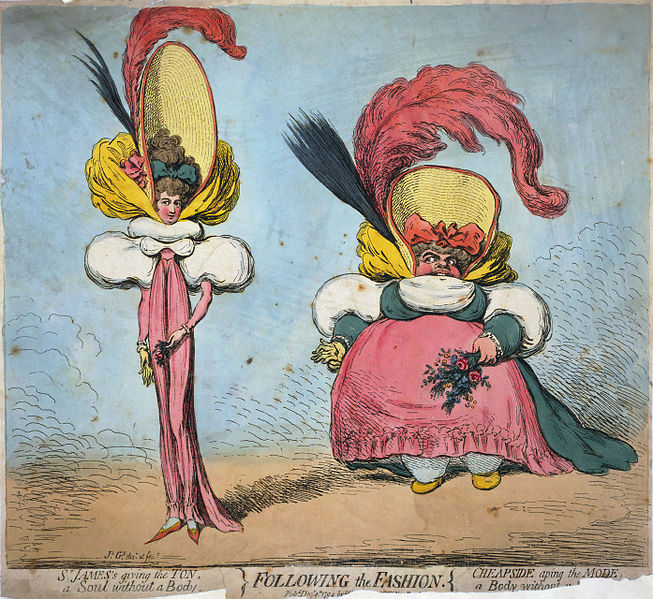
For those who are fans of historical costuming, here is a link to the New York Metropolitan Museum of Art's online searchable database.
You can see the real versions of these clothes:
The Beau Brummel Mystery Series!
And book reviews!

The Amateur Historian, as it must be admitted, has a soft spot for dandies, and Beau Brummel is certainly the One Dandy to Rule Them All. So, when she spotted a mystery series about said gentleman, she immediately checked out several books at once. The text itself is... mostly successful. Sort of.
It is extremely clear that the Beau Brummell mystery series by Rosemary Stevens is painstakingly and wonderfully researched, but the Amateur Historian has to question both the detective ability of a man who took four hours to get dressed every morning, and the author's addiction to descriptive clause openings for sentences. If you will forgive the momentary pastiche, a paragraph reads something like: "Wearing a black bombazine dress with a high- waist and a black lace mantilla, she came towards me. Thinking quickly, I deduced it was because no one of fashion wears bombazine unless they were in mourning. As I am known as the arbitrator of fashion, she should have known better- how could she have known her rich uncle had been foully murdered when I had out-ridden the messenger come from London? Smirking, I lifted my quizzing glass...." and so on and so forth until there's slightly awkward dialogue.
The problem with having really clever characters- or using historical personages that are well known for their bon mots and on-dits and scathing wit- is that they actually have to sound clever when they're speaking. If one is not particularly clever at turning a phrase in Austen-style language, or coming up with a subtle yet scathing insult without tumbling into cringe-inducing territory, one had best get a really cracking editor. Beau Brummel was known as much as for what he said as for what he wore. There is also the matter of Brummell's love life. Though one would have certain... associations, shall we say, with basically the Regency equivalent of a male model, Brummell is staunchly heterosexual and, oh joy of joys, also receives a Mary Sue as his potential love interest, as well as (for some reason) the Duchess of York. You know, the one who was so ugly all the newspapers praised her small feet, leading Gillray to create this print?

She's apparently prettier than the Duchess of Devonshire.
Yeah.
On the other hand, the plotting of the mystery is excellent and the murders are always extremely interesting. They read like plots Agatha Christy might have come up with if she was writing about Regency Britain.
The Beau Brummel mystery series has the distinction of being better plotted than another series of novels solved by real life historical figures of the Regency Era, i.e. the Jane Austen mystery series. Neither of them has the distinction of having main characters as witty as their real life counterparts. The Amateur Historian's advice on the disappointing repartee in both?
If you are going to have someone famous for their wit as your main character, you have to make them witty. This is one case where shameless plagerism of someone else's aphorisms and quips is a really good idea.





